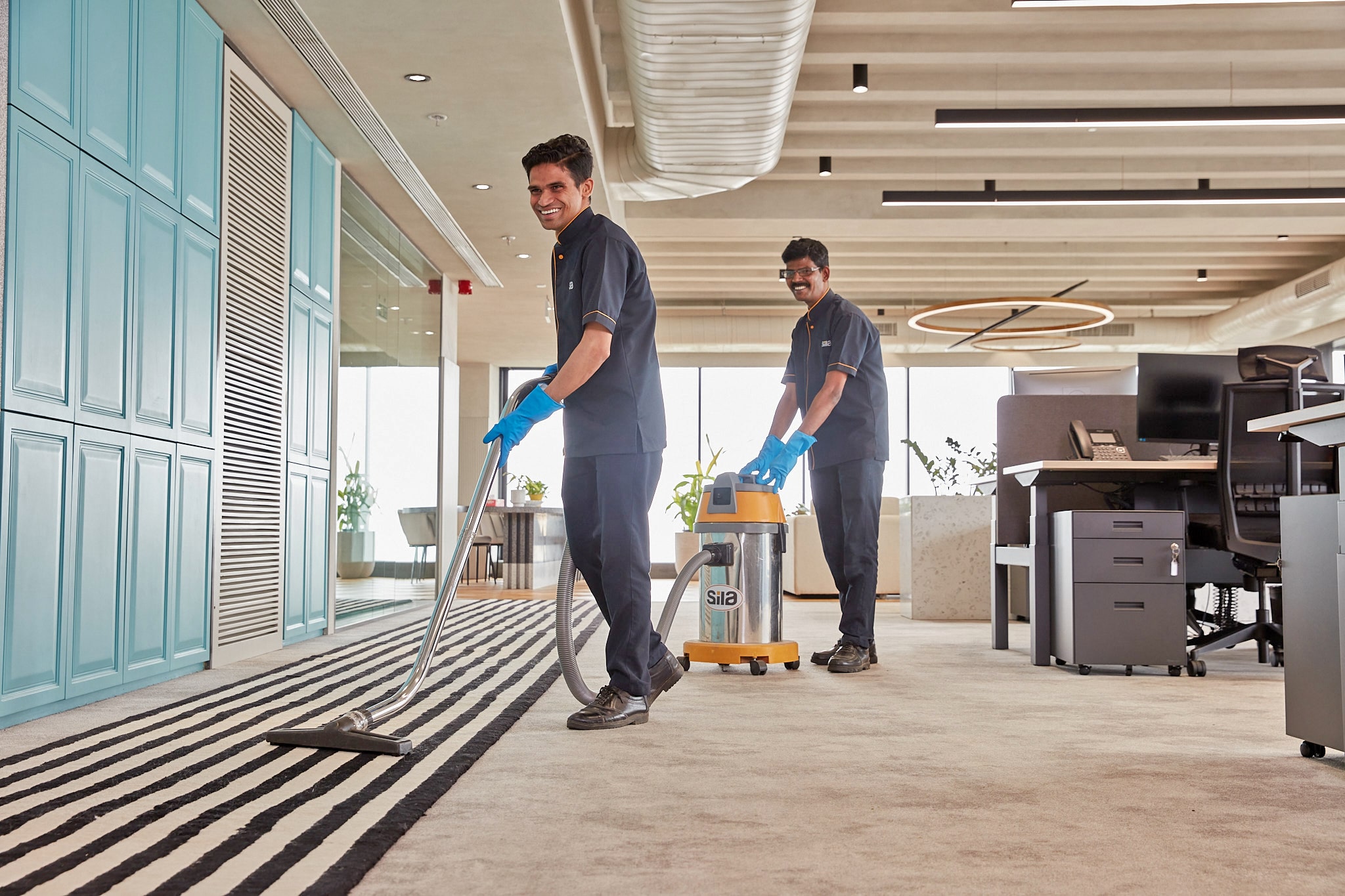Facility Services Management Best Practices for 2025
In today’s competitive business environment, facility services management is no longer a background function—it’s a core driver of efficiency, sustainability, and business growth. As workplaces evolve with technology, hybrid work models, and rising sustainability demands, the need for advanced facility management solutions has never been more critical.
2025 brings new challenges and opportunities for facilities management companies. Businesses now expect facility management services to not only maintain operational standards but also to deliver strategic value. From energy optimization to predictive maintenance, the way we manage facilities is becoming smarter, data-driven, and more integrated.
In this article, we explore the best practices for facility services management in 2025, blending global standards with local insights—while highlighting how companies like SILA are setting benchmarks in Facility management India.
1. Adopting an Integrated Facility Management Approach
One of the most impactful trends in facility services management is the shift towards integrated facility management (IFM). Instead of handling separate vendors for cleaning, security, maintenance, and catering, companies now prefer a single-point solution.
Best Practice:
- Consolidate all facilities and management services under one provider to improve efficiency, reduce costs, and ensure accountability.
- Use a centralized technology platform for tracking performance, maintenance schedules, and compliance.
Why It Works in 2025:
In an era where facilities management companies are under pressure to deliver measurable ROI, integration allows for better coordination, data-driven decision-making, and scalability.
2. Leveraging Data and Technology for Smarter Operations
Technology is transforming facility management India at a rapid pace. IoT-enabled sensors, AI-driven analytics, and automated workflows are becoming standard in facility management services.
Best Practice:
- Implement smart building systems for energy monitoring, air quality control, and predictive maintenance.
- Use AI-based tools to forecast equipment failures before they happen.
- Integrate mobile apps for reporting issues in real time.
Why It Works in 2025:
Technology doesn’t just make operations more efficient—it reduces downtime, lowers costs, and enhances workplace comfort. For facilities management companies, this means moving from reactive to proactive service delivery.
3. Prioritizing Sustainability and ESG Compliance
Businesses are under increasing scrutiny to meet Environmental, Social, and Governance (ESG) standards. Facility services management plays a crucial role in achieving these targets.
Best Practice:
- Switch to green cleaning products and sustainable waste management solutions.
- Optimize energy consumption through smart lighting and HVAC systems.
- Ensure compliance with local and international sustainability standards.
Why It Works in 2025:
Sustainability isn’t just about corporate responsibility—it reduces operational costs and enhances brand reputation. For facility management companies, it’s a competitive advantage in winning long-term contracts.
4. Enhancing Workplace Experience
Modern workplaces demand more than just functional facilities—they require an environment that supports productivity, well-being, and collaboration.
Best Practice:
- Design spaces that promote flexibility and creativity.
- Maintain optimal air quality, lighting, and ergonomic setups.
Offer services like wellness rooms, cafeterias, and relaxation zones.
Why It Works in 2025:
Happy, healthy employees are more productive and engaged. Facilities and management services that focus on employee experience directly contribute to business performance.
5. Strengthening Business Continuity Planning
The pandemic highlighted the importance of facility management solutions in crisis preparedness. In 2025, facility services management must be equipped to handle emergencies with minimal disruption.
Best Practice:
- Develop contingency plans for power outages, IT failures, and health emergencies.
- Train staff for rapid response to incidents.
- Maintain backup systems for critical operations.
Why It Works in 2025:
A robust business continuity plan ensures facility management services can safeguard operations even during unexpected disruptions.
6. Investing in Workforce Training and Development
Even with automation, skilled human intervention remains essential in facility management India. Training enhances service quality, safety, and client satisfaction.
Best Practice:
- Regular upskilling programs for technical staff.
- Training in customer service, safety protocols, and compliance.
- Encouraging multi-skilled teams for flexibility.
Why It Works in 2025:
Well-trained teams are more efficient, adaptable, and capable of delivering premium facility management services that stand out in a competitive market.
7. Ensuring Compliance and Safety Standards
In industries like healthcare, manufacturing, and IT, compliance is non-negotiable. Facilities management companies must maintain high safety and regulatory standards.
Best Practice:
- Keep documentation up-to-date for audits.
- Conduct regular safety drills and equipment checks.
- Use digital tools for compliance tracking.
Why It Works in 2025:
Compliance isn’t just about avoiding penalties—it builds trust with clients, employees, and stakeholders.
8. Focusing on Cost Efficiency Without Compromising Quality
While businesses aim to reduce operational costs, they cannot afford a dip in service quality. The challenge for facility management companies is to optimize budgets without cutting corners.
Best Practice:
- Use technology for predictive maintenance to prevent costly repairs.
- Negotiate vendor contracts strategically.
- Adopt energy-saving technologies.
Why It Works in 2025:
Cost efficiency backed by facility management solutions ensures businesses get maximum value without compromising service levels.
9. Customizing Solutions for Industry-Specific Needs
Each industry has unique operational demands. A retail store’s needs differ from a pharmaceutical plant’s. Facility services management must adapt accordingly.
Best Practice:
- Understand industry-specific compliance requirements.
- Customize maintenance schedules and service protocols.
- Offer specialized services like cleanroom management for pharma or secure access for data centers.
Why It Works in 2025:
Customization builds client trust and positions facilities management companies as strategic partners rather than just service providers.
10. Building Long-Term Client Relationships
In 2025, facility management companies that focus on relationships will retain clients longer. Beyond contracts, it’s about partnership and trust.
Best Practice:
- Maintain open communication with clients.
- Provide transparent reporting on service performance.
- Offer value-added insights to help clients optimize operations.
Why It Works in 2025:
Strong relationships create stability and lead to referrals—critical for business growth in Facility management India.
Conclusion: Leading with Excellence in 2025
The future of facility services management lies in its ability to blend technology, sustainability, and customer experience into one seamless offering. The best facilities management companies will move beyond maintenance to deliver measurable business value.
At SILA, we specialize in integrated facility management, offering a full range of facility management solutions that help businesses operate more efficiently, sustainably, and profitably. With a proven track record in Facility management India, our approach combines innovation, compliance, and customer focus—making us a trusted partner for companies across industries.
If you’re ready to align your facilities strategy with 2025’s best practices, explore how SILA can help you achieve operational excellence.
Also Read: Top Trends in Integrated Facility Management in Mumbai’s Commercial Sector
FAQs
1. What is Facilities and Management, and why is it important?
Facilities and Management refers to the strategic coordination of the physical workplace with the people and work of an organization. It ensures buildings are functional, safe, efficient, and conducive to productivity. FM covers everything from maintenance and operations to safety, space planning, and sustainability. It plays a critical role in reducing costs, supporting employee well-being, and aligning the physical environment with organizational goals.
2. What are the core responsibilities of a Facilities Management team?
Key responsibilities include:
- Maintenance and Operations: Routine upkeep, cleaning, repairs, and inspections.
- Space Planning: Optimizing physical space for productivity.
- Safety and Compliance: Meeting health, safety, and environmental regulations.
- Security: Protecting occupants and assets.
- Sustainability: Implementing green, energy-saving practices.
- Cost Control: Budgeting and resource allocation.
- Emergency Management: Ensuring business continuity during crises.
- Technology Integration: Using tools like CMMS and building automation systems.
3. Who is involved in delivering Facilities Management services?
Facilities Management is delivered by a diverse team, including:
- Facilities Managers: Lead strategy, budgeting, and operations.
- Maintenance Staff: Handle repairs and equipment upkeep.
- Cleaning Staff: Maintain cleanliness and hygiene.
- Security Personnel: Ensure the safety of people and property.
- Support Staff: Includes landscaping, groundskeeping, and admin teams.
Each role is essential for the effective functioning of a facility.
4. How does Facilities and Management contribute to cost savings?
Efficient facilities and management can significantly reduce operational costs through:
- Preventive maintenance that avoids expensive repairs.
- Optimized energy usage via smart systems and automation.
- Better space utilization, reducing real estate overhead.
- Streamlined operations and vendor management.
- Lifecycle management of assets, avoiding early replacements.
These practices lead to long-term financial savings while improving performance.
About SILA -
A Real Estate platform driven by an entrepreneurial spirit.
Our businesses include Real Estate Services which offer Facility Management, Material Handling Solutions and Real Estate Advisory. Our other business is Real Estate Development. We have a diverse client base in various sectors which include large Corporates, Real Estate Funds, Landowners and Developers.
Over the last decade, SILA has scaled efficiently, managing over 300 million square feet of assets, with over 30,000 employees pan India. The platform is backed by Norwest Venture Partners and Samara Capital Group in our Real Estate Services and Development arms, respectively.
SILA is one of the best property management companies in Bangalore, Mumbai, Delhi, Chennai, Hyderabad, Pune & more.
SILA is among the top facility management companies in India, offering comprehensive Facility management services. As a leading facility services management company, SILA provides tailored FM solutions, including housekeeping services in Bangalore. Leveraging our expertise, we ensure seamless property management for clients nationwide. Whether you require housekeeping agency support or specialized facility management solutions, SILA delivers excellence in every aspect of your Housekeeping services in India, property’s upkeep and maintenance. With a proven track record in Facility Management India, SILA continues to set benchmarks in efficient and sustainable property management.
About Author -

Aniket Sheth
The insightful content in this blog is curated by Aniket Sheth, our esteemed Senior Vice President of Operations. With an impressive professional journey spanning over 13 years, Aniket has held key positions at prestigious brands, showcasing his exceptional leadership skills.
Aniket’s educational background is marked by an MBA from Cornell University, which laid the foundation for his successful career. He began his professional journey at EY in New York, contributing significantly to enhancing and implementing engagements for Fortune 500 companies.
Aniket’s strategic acumen, proficiency in asset management, and forward-thinking innovation have been instrumental in helping companies streamline their operations and achieve substantial cost reductions. His wealth of experience brings a unique perspective to the world of facilities management, making his insights invaluable for businesses seeking operational excellence.


